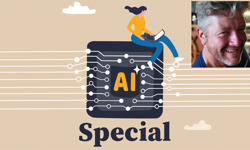
How far have you got on your AI journey?
In our just published AI Special (available to read online and also as a downloadable PDF), Markus Karlsson advises publishers to, “try things out, and fully embrace the opportunities from AI. Those that don’t will be seriously challenged even in the near future.”
So, we thought we’d better start practicing what we, or at least our contributors, preach.
We are still very much in the experimentation phase. It’s early days, but I thought I would share with you some of our first impressions.
We’re currently experimenting in two areas, one ‘workflow’ related and the other what I would very loosely term ‘new product’ related.
First up, ‘workflow’. When we upload articles to our website, we go through a four step process: i: Save the document as a text file; ii: Run the text file through an html converter; iii: Copy and paste the resulting file into our CMS; iv: There, apply header tags and other formatting. It works fine, but Daniel, our web developer, knocked up, in a couple of minutes, a prompt that would allow us to reduce those four steps to two. We’re still experimenting with it and can probably refine the prompt further, but it looks like adopting it could shave minutes off the upload time for each article we publish.
Secondly, ‘new product’. I hasten to add that we have no ‘new’ product in mind, but inspired by the example of ‘Ask Nursing Times’ (also featured in our AI Special), and aware that we have over 20k articles in our archive, we thought it might be interesting to experiment with something similar.
So, we (Daniel again) created a framework which would ringfence a subset of our archive in response to a question and he then created a prompt to get the LLM (we used Claude this time) to produce a response.
The question we fed in was: ‘How can newspaper and magazine publishers and their suppliers make the sector more sustainable and reduce its carbon footprint?’
The response we got was … err … ok …. On the plus side, it answered the question, it was coherent and contained some good advice. On the minus side, I know it wasn’t as good an answer as it could have been and it misattributed a quote. These technologies really do make stuff up!
Encouragingly, it was our first test and we know there are lots of areas where we can tighten up, including ensuring a more relevant subset of the archive is selected and further refining the prompt we put to the LLM.
At this stage, I really have no idea where this might take us. Maybe nowhere, but, maybe somewhere, one day, possibly.
I will keep you informed. In the meantime, the experimentation goes on!
You can catch James Evelegh’s regular column in the InPubWeekly newsletter, which you can register to receive here.












